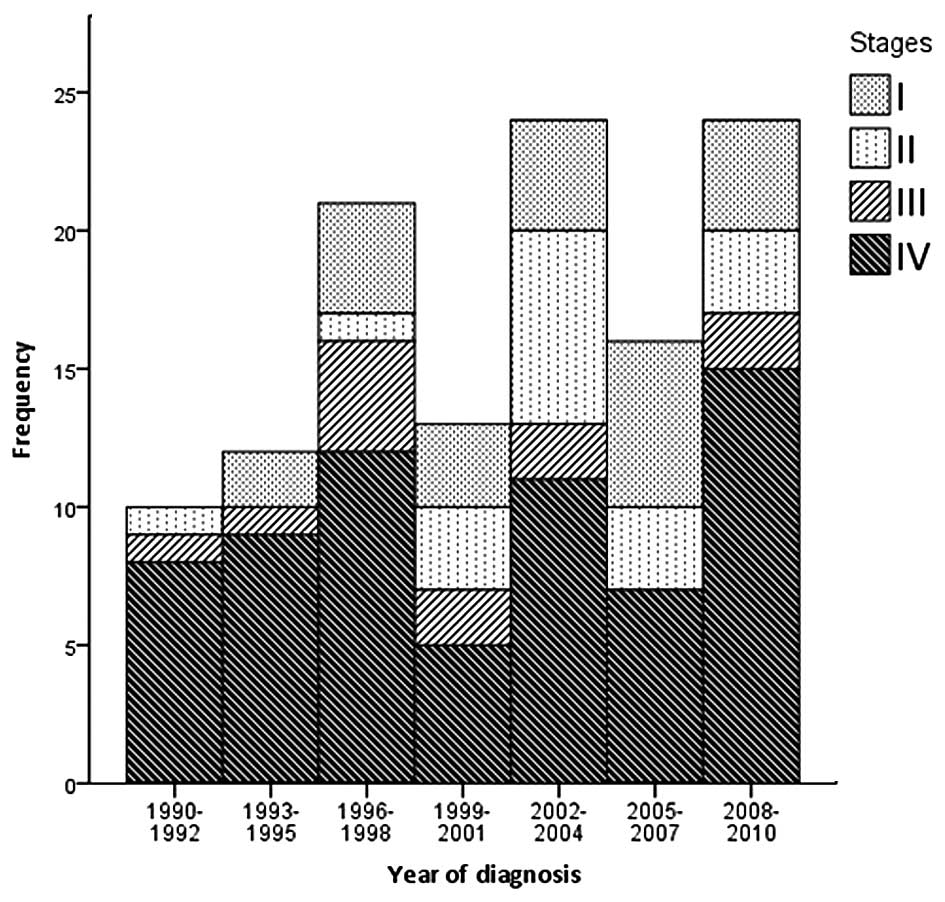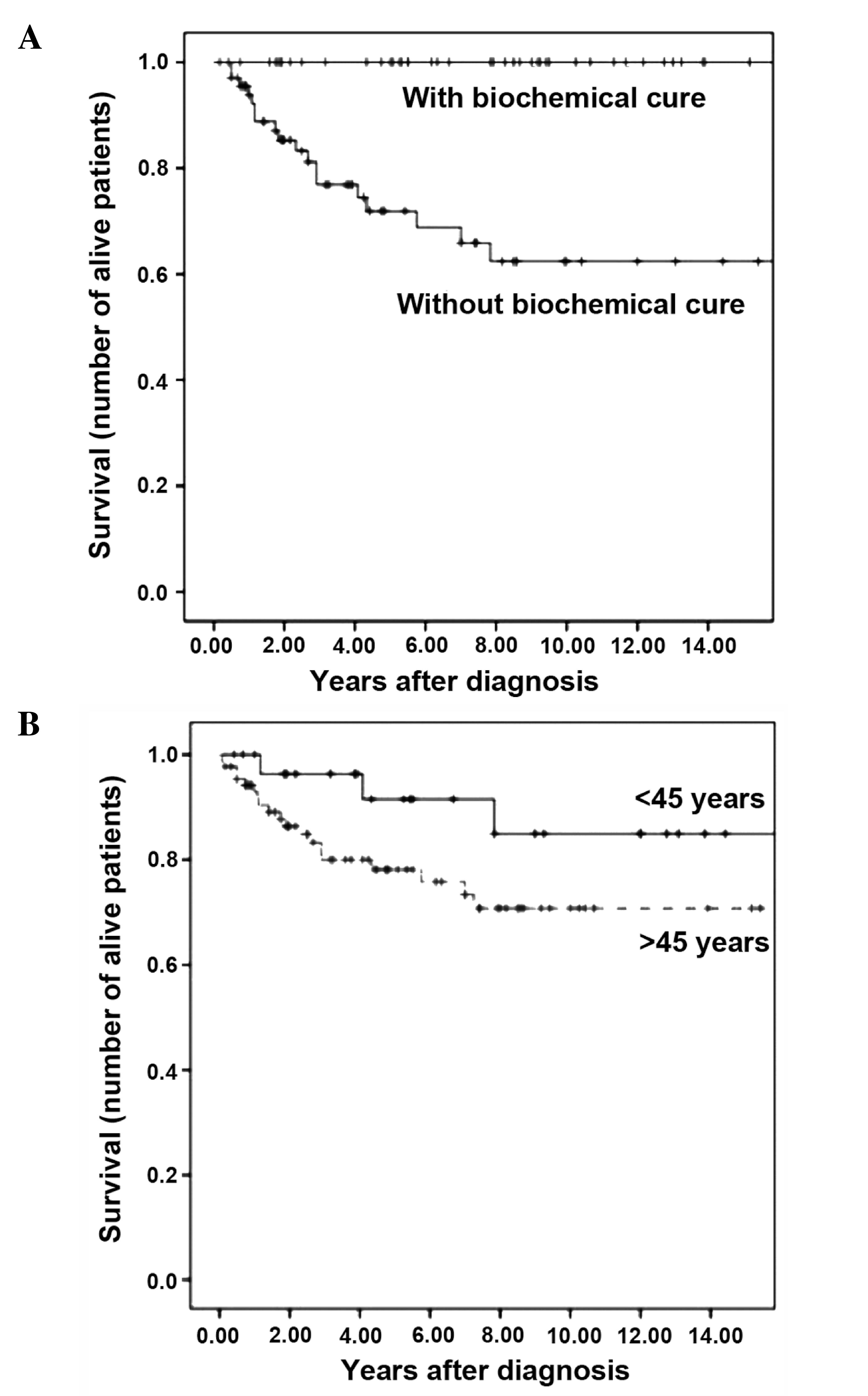|
1
|
Hundahl SA, Fleming ID, Fremgen AM and
Menck HR: A National Cancer Data Base report on 53,856 cases of
thyroid carcinoma treated in the U.S., 1985–1995. Cancer.
83:2638–2648. 1998. View Article : Google Scholar : PubMed/NCBI
|
|
2
|
Kloos RT, Eng C, Evans DB, Francis GL,
Gagel RF, Gharib H, Moley JF, Pacini F, Ringel MD, Schlumberger M
and Wells SA Jr: American Thyroid Association Guidelines Task
Force: Medullary thyroid cancer: Management guidelines of the
American Thyroid Association. Thyroid. 19:565–612. 2009. View Article : Google Scholar : PubMed/NCBI
|
|
3
|
Elisei R, Bottici V, Luchetti F, Di Coscio
G, Romei C, Grasso L, Miccoli P, Iacconi P, Basolo F, Pinchera A
and Pacini F: Impact of routine measurement of serum calcitonin on
the diagnosis and outcome of medullary thyroid cancer: Experience
in 10,864 patients with nodular thyroid disorders. J Clin
Endocrinol Metab. 89:163–168. 2004. View Article : Google Scholar : PubMed/NCBI
|
|
4
|
Evans DB, Fleming JB, Lee JE, Cote G and
Gagel RF: The surgical treatment of medullary thyroid carcinoma.
Semin Surg Oncol. 16:50–63. 1999. View Article : Google Scholar : PubMed/NCBI
|
|
5
|
Fleming JB, Lee JE, Bouvet M, Schultz PN,
Sherman SI, Sellin RV, Friend KE, Burgess MA, Cote GJ, Gagel RF and
Evans DB: Surgical strategy for the treatment of medullary thyroid
carcinoma. Ann Surg. 230:697–707. 1999. View Article : Google Scholar : PubMed/NCBI
|
|
6
|
Kebebew E, Ituarte PH, Siperstein AE, Duh
QY and Clark OH: Medullary thyroid carcinoma: Clinical
characteristics, treatment, prognostic factors, and a comparison of
staging systems. Cancer. 88:1139–1148. 2000. View Article : Google Scholar : PubMed/NCBI
|
|
7
|
Leboulleux S, Baudin E, Travagli JP and
Schlumberger M: Medullary thyroid carcinoma. Clin Endocrinol (Oxf).
61:299–310. 2004. View Article : Google Scholar : PubMed/NCBI
|
|
8
|
Greene FL, Page DL, Fleming ID, Fritz A
and Balch DM: AJCC Cancer Staging Manual (6th). Springer Verlag.
Chicago: 2003.
|
|
9
|
Bugalho MJ, Domingues R, Santos JR,
Catarino AL and Sobrinho L: Mutation analysis of the RET
proto-oncogene and early thyroidectomy: Results of a Portuguese
cancer centre. Surgery. 141:90–95. 2007. View Article : Google Scholar : PubMed/NCBI
|
|
10
|
Moura MM, Cavaco BM, Pinto AE, Domingues
R, Santos JR, Cid MO, Bugalho MJ and Leite V: Correlation of RET
somatic mutations with clinicopathological features in sporadic
medullary thyroid carcinomas. Br J Cancer. 100:1777–1783. 2009.
View Article : Google Scholar : PubMed/NCBI
|
|
11
|
Moura MM, Cavaco BM, Pinto AE and Leite V:
High prevalence of RAS mutations in RET-negative sporadic medullary
thyroid carcinomas. J Clin Endocrinol Metab. 96:E863–E868. 2011.
View Article : Google Scholar : PubMed/NCBI
|
|
12
|
Marsh DJ, Learoyd DL and Robinson BG:
Medullary thyroid carcinoma: Recent advances and management update.
Thyroid. 5:407–424. 1995. View Article : Google Scholar : PubMed/NCBI
|
|
13
|
Gharib H, Papini E, Paschke R, Duick DS,
Valcavi R, Hegedüs L and Vitti P: AACE/AME/ETA Task Force on
Thyroid Nodules: American Association of Clinical Endocrinologists,
Associazione Medici Endocrinologi, and European Thyroid Association
medical guidelines for clinical practice for the diagnosis and
management of thyroid nodules: Executive summary of
recommendations. J Endocrinol Invest. 33(Suppl 5): S51–S56.
2010.
|
|
14
|
Bugalho MJ, Santos JR and Sobrinho L:
Preoperative diagnosis of medullary thyroid carcinoma: Fine needle
aspiration cytology as compared with serum calcitonin measurement.
J Surg Oncol. 91:56–60. 2005. View Article : Google Scholar : PubMed/NCBI
|
|
15
|
Papaparaskeva K, Nagel H and Droese M:
Cytologic diagnosis of medullary carcinoma of the thyroid gland.
Diagn Cytopathol. 22:351–358. 2000. View Article : Google Scholar : PubMed/NCBI
|
|
16
|
Cupisti K, Wolf A, Raffel A, Schott M,
Miersch D, Yang Q, Eisenberger CF, Röher HD and Knoefel WT:
Long-term clinical and biochemical follow-up in medullary thyroid
carcinoma: A single institution's experience over 20 years. Ann
Surg. 246:815–821. 2007. View Article : Google Scholar : PubMed/NCBI
|
|
17
|
Wells SA Jr and Franz C: Medullary
carcinoma of the thyroid gland. World J Surg. 24:952–956. 2000.
View Article : Google Scholar : PubMed/NCBI
|
|
18
|
Kameyama K and Takami H: Medullary thyroid
carcinoma: Nationwide Japanese survey of 634 cases in 1996 and 271
cases in 2002. Endocr J. 51:453–456. 2004. View Article : Google Scholar : PubMed/NCBI
|
|
19
|
Modigliani E, Cohen R, Campos JM,
Conte-Devolx B, Maes B, Boneu A, Schlumberger M, Bigorgne JC,
Dumontier P, Leclerc L, et al: Prognostic factors for survival and
for biochemical cure in medullary thyroid carcinoma: Results in 899
patients. The GETC Study Group. Groupe d'etude des tumeurs à
calcitonine. Clin Endocrinol (Oxf). 48:265–273. 1998. View Article : Google Scholar : PubMed/NCBI
|
|
20
|
Grozinsky-Glasberg S, Benbassat CA,
Tsvetov G, Feinmesser R, Peretz H, Shimon I and Lapidot M:
Medullary thyroid cancer: A retrospective analysis of a cohort
treated at a single tertiary care center between 1970 and 2005.
Thyroid. 17:549–556. 2007. View Article : Google Scholar : PubMed/NCBI
|
|
21
|
Rohmer V, Vidal-Trecan G, Bourdelot A,
Niccoli P, Murat A, Wemeau JL, Borson-Chazot F, Schvartz C, Tabarin
A, Chabre O, et al: Groupe Français des Tumeurs Endocrines:
Prognostic factors of disease-free survival after thyroidectomy in
170 young patients with a RET germline mutation: A multicenter
study of the Groupe Français d'Etude des Tumeurs Endocrines. J Clin
Endocrinol Metab. 96:E509–E518. 2011. View Article : Google Scholar : PubMed/NCBI
|
|
22
|
Frank-Raue K, Buhr H, Dralle H, Klar E,
Senninger N, Weber T, Rondot S, Höppner W and Raue F: Long-term
outcome in 46 gene carriers of hereditary medullary thyroid
carcinoma after prophylactic thyroidectomy: Impact of individual
RET genotype. Eur J Endocrinol. 155:229–236. 2006. View Article : Google Scholar : PubMed/NCBI
|
|
23
|
Dottorini ME, Assi A, Sironi M, Sangalli
G, Spreafico G and Colombo L: Multivariate analysis of patients
with medullary thyroid carcinoma. Prognostic significance and
impact on treatment of clinical and pathologic variables. Cancer.
77:1556–1565. 1996. View Article : Google Scholar : PubMed/NCBI
|
















